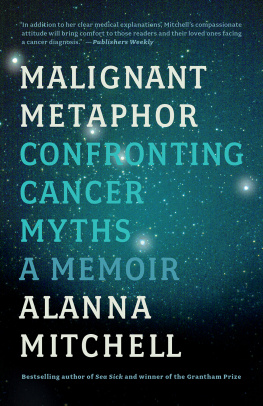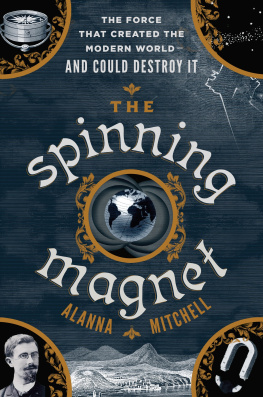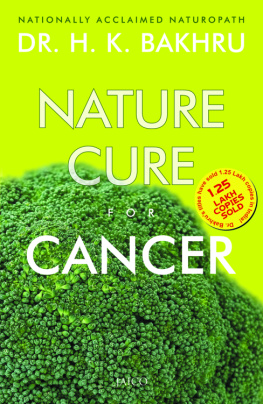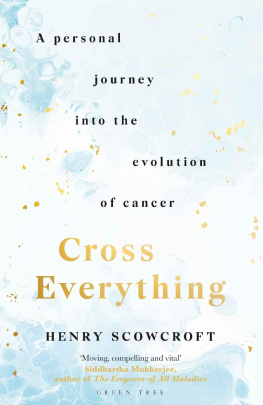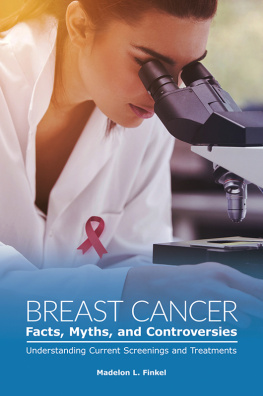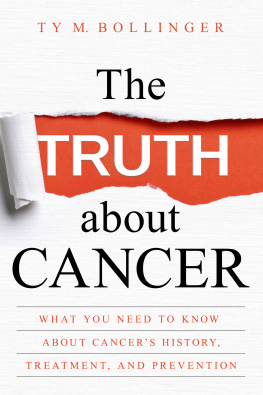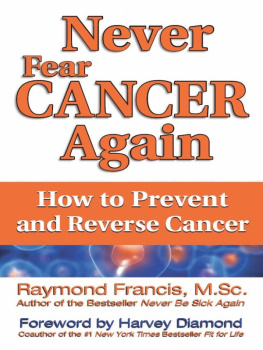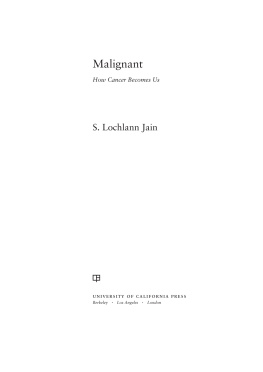I started writing this book because cancer barged into my life. It was always in the background, pouncing on friends and acquaintances, but then it hit closer. First, my beloved brother-in-law, John, got it. Then, my 21-year-old daughter, Calista, was diagnosed and the quest to understand cancer became even more personal.
I am a journalist who writes about science and medicine, and John asked me to help him learn more about the disease. But I would have done it anyway because I needed to understand more about how this terrible disease was threatening the lives of people I love. And beyond that, I needed to get to the bottom of why the idea of cancer filled me with a sense of powerlessness and dread, in a way that other potentially fatal illnesses do not.
Ive spent much of my professional life focused on things that seem unknowable in order to demystify and elucidate them. I think of it as democratizing knowledge. The question I always ask myself is: if we were to take this slice of history and look back at it in 100 years, what would we see that we cant see now? That sense has underpinned my writing on environmental issues, including climate change and ocean acidification. So, when it comes to cancer, what are the stories that we cant yet see? How does cancer show up in our cultural flesh? What meaning courses below the surface, beyond the crushing reality that cancer is one of the biggest killers in the rich parts of the world the biggest in Canada and the United Kingdom and second after heart disease in the U.S.?
Like so many other important modern phenomena, cancers contemporary cultural meaning is often shrouded, occluded, even taboo. We come at it obliquely, I think, often not knowing ourselves what we make of it. These subtexts are subtle, unacknowledged, unparsed, like those that have informed racism or sexism or homophobia or xenophobia in human history. Susan Sontag, the American essayist who wrote Illness as Metaphor (1978) and then AIDS and Its Metaphors (1989) and who died of cancer, argues that we create fantasies about the diseases we understand poorly, lurid metaphors that inhabit the landscape of the kingdom of the ill.
As Ive dug into that landscape, following Sontags lead from nearly 40 years ago, Ive come to believe that cancer suffers from a disease bigotry that shows itself in the stories we tell each other about it, and that it intrudes into our lives in ways we may not recognize.
Those stories are multipronged, like cancer itself. They are not the same for everyone. I have a friend, David, whose lover of 33 years died just 16 days after discovering he had pancreatic cancer. Compared to surviving the institutionalized prejudice of being gay in the North America of the 1970s and 1980s and later watching friends fall ill and die of HIV/AIDS, cancer doesnt bear much of a stigma for David. And today many in the medical profession who treat cancer patients are solemn but not judgmental; it is mainly a disease to be treated. The most recent time I had a breast cancer scare, the surgeon a lovely, merry man evincing not a shred of pity asked me a single question: did anyone in my family have breast cancer? When I told him that my mothers paternal aunt had it in her 80s, he looked off into the distance for a moment and then smiled broadly as he said, Im not going to hold that against you! No probing questions about my lifestyle or frame of mind, or darkest secrets, or history of child-bearing and breast-feeding. It was such a relief.
But in general, cancer has a powerful, deadly hold over the collective imagination, far greater than even its impressive killing power merits. Our societys overwhelming metaphor of cancer the meaning it bears within itself is malignant.
Cancer carries a fearsome stigma for many who get it, as several recent studies show. Those diagnosed feel disqualified from society, shunned. One study catalogs patients whose friends refuse to use the word cancer, as if it is a jinx or a threat even to utter the syllables. They say friends refuse to see them until theyre declared cancer-free. One described feeling as though she was wearing a lepers bell. Another said people crossed the street to avoid coming in contact with her. A British study published in 2005 found that rather than fear of cancer waning over the years, as scientific knowledge grows and survival rates lengthen, it has remained the same. The British charity Cancer Research U.K. reports that cancer is the number-one fear for the British public, ahead of debt, crime and losing a job. Its a similar picture in Australia.
And some doctors, nurses and other caregivers are just as infused with this powerful imagery as anyone else. When asked to draw pictures of patients who had cancer and AIDS, they drew incomplete outlines, often with internal organs hanging out, writes the Australian poet Cathy Altmann in a cultural critique of cancer. The patients had no hair, no gender, no context. It was as if they had been wholly defiled, their very selves disrupted. Drawings of heart patients by the same medical practitioners, by contrast, were highly detailed, personalized, sometimes even shown with clothing. Heart disease didnt strip the patients of their identity; they just had a problem with their hearts.
I reckon it has come to this: we fear that cancer is three irreconcilable things all at once inevitable, preventable and deserved. Logically, we know it cant be all three. If its inevitable, how can it also be preventable, for one thing? If its preventable, why does a baby get it, or those who lived virtuously their whole lives? If its deserved, why do some good people get it and some evil people dodge it? Yet that unnamed triumvirate permeates much of the public discourse about cancer, both spoken and unspoken.
When I started excavating our cancer culture, I found many signs of our illogical, impossible belief system, fears buried deep. Let me give you a few examples.
Inevitable: A few years ago when my son, Nick, had just started university he was in one of those chemistry classes so packed that some of the nearly 2,000 students were sitting in the aisles his professor wanted to drive home the pervasiveness, the implacability of cancer. Look at the person on your right, he instructed the students. And then look to your left. One of the three of you will die of cancer. Even the cockiest of the students conjured up images of an inevitable mass die-off of the young.
In fact, what the professor ought to have said is that one in three of those brilliant young people will live long enough and healthily enough dodging infections, accidents and hereditary diseases to die of cancer. United Kingdom statistics show, for example, that nearly 80 per cent of people who died of cancer between 2010 and 2012 were senior citizens and half of them were 75 or older. Cancer is mainly a disease of the old, not the inevitable plague of the young and healthy. The vast majority of us could bop along pretty safely until we are senior citizens without worrying too much about cancer, unless we smoke.
Preventable: When the child of a close friend was diagnosed with a rare, fatal soft-tissue cancer that had spread to her lungs, everyone who knew her said, But shes been a vegetarian from birth, eating only organic foods. Shes a wizard at soccer and an accomplished dancer. How could this happen? It seemed impossible to us that such a healthy lifestyle had not been able to prevent her illness. The real story is that her cancer was just random, just terrible luck. Perhaps a quirk of the genetic coding that she was born with. It wasnt her fault and likely couldnt have been prevented by any means whatsoever.

